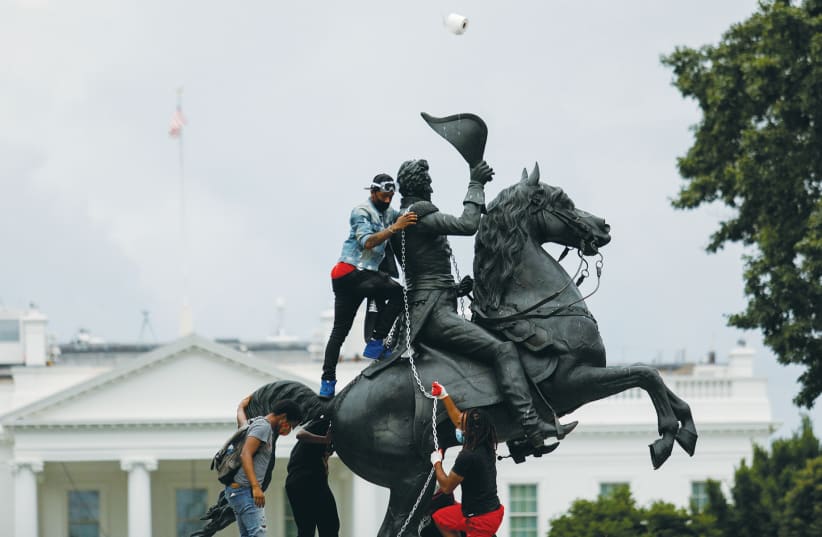“I end up having this angst every semester,” Prof. Sandra Sellers said privately to a colleague, David Batson. “A lot of my lower ones are Blacks [and] just plain at the bottom. It drives me crazy.”
The comment was somehow posted on social media – immediately kicking in the contemporary notion of “cancel culture,” a latter-day form of ostracism whereby ideas are condemned and rejected if they are considered to be politically incorrect.
Thus did Georgetown Dean Bill Treanor reflexively terminate Prof. Sellers and place Prof. Batson on administrative leave: “I am appalled,” he said, “that two members of our faculty engaged in a conversation that included reprehensible statements concerning the evaluation of Black students.”
Whatever happened to the once-noble American traditions of free speech, an open marketplace of ideas and academic freedom?
The First Amendment was designed to protect virtually all manner of expression – not just praising motherhood and apple pie but uttering provocative, even offensive, ideas as well – from governmental control or suppression. The goal was to encourage an open marketplace of ideas, testing their truth by competition with other statements, not by the opinion of an authoritarian censor.
Similarly, academic freedom rests upon the moral and legal conviction that unfettered inquiry by faculty is essential to their mission – that scholars must have the ability to communicate both fact and concept, including those that may be alien to the public at large or sectarian political groups or governmental authorities, without fear of repression or job loss or imprisonment.
Coming down the cancel-culture chute at virtually the same time was the spontaneous resignation of Alexi McCammond as the new Teen Editor of Vogue magazine, after her appointment drew complaints because of allegedly racist and homophobic tweets she had posted a decade ago, when she’d complained about Asian teaching assistants she thought were incompetent.
And now there’s the annual flap over Sports Illustrated’s Swimsuit Issue, which in the past has centered around feminist complaints about the objectification of women. But this year SI bravely wandered into the world of woke by featuring a transgender man/woman as its centerfold. The editors praised Leyna Bloom’s “undeniable sense of self that shines through the minute she walks on set. Her story represents one grounded in resilience and we couldn’t be more thrilled to help her tell it.”
All of these flaps reflect cancel culture’s new national purpose of sanitizing the world in which we live. Its proponents ignore both history and reality.
The ostensible outrage they feel over Prof. Sellers’s comments about Blacks should pale in comparison with the way America’s Founding Fathers actually treated people they deemed inferior. No fewer than a dozen American presidents owned slaves. George Washington kept over 300, although he preferred to call them “servants” and conceded that human bondage was “a wicked, cruel, and unnatural trade.”
But Washington recognized that slaves were integral to the early American economy and fully approved of whipping them if the occasion warranted. “There are few Negroes who will work unless there be a constant eye on them,” Washington advised an overseer, warning of their “idleness and deceit” unless treated sternly. By today’s standards that view would be considered decidedly racist.
Thomas Jefferson, who authored the phrase “all men are created equal” in the Declaration of Independence, owned more than 600 slaves during his lifetime. He once confided to a friend that he envisaged eventual emancipation as “exporting to a distance the whole black race.”
In his Federalist Paper No. 54, James Madison, who kept around 100 slaves, defended the famous Three-Fifths Compromise, which counted black people as only three-fifths of a person when allotting southern states electoral votes and seats in Congress.
Nor, in fact, could any of the presidents who followed conceive of a biracial society. James Monroe, Andrew Jackson, Martin Van Buren, William Henry Harrison, John Tyler, James Polk, Zachary Taylor, Andrew Johnson and Ulysses S. Grant all owned slaves. Even Abraham Lincoln, the Great Emancipator, was tainted by his early attitudes toward Black people; his expressed feelings that they were inferior would certainly have raised eyebrows today.
Even more visible is the way self-appointed protectors of our collective moral conscience seek to erase the facts of history. Thus, do we witness calls to decontaminate public parks by removing monuments perceived to be morally toxic, such as the statues of Washington at the University of Texas and of Jefferson at the University of Missouri. Christ Church in Alexandria, Va., has already removed memorials to Washington and former Confederate General Robert E. Lee, which stood on either side of the altar.
In Baltimore, once known as “Monumental City” because it had more statues per capita than any other place in America, former Mayor Catherine Pugh took it upon herself to dismantle statues of Lee and Roger Taney, the latter of which had long stood in Mount Vernon Square, a half-block north of the nation’s first monument to Washington. Taney is now known primarily for his Supreme Court opinion in the 1857 Dred Scott case, which declared that black people “had no rights which the white man was bound to respect.” (In fact Taney was personally opposed to slavery and freed his own slaves early in his career.)
One wonders how PC revisionists might handle the huge stone sculptures of Washington and Jefferson at Mount Rushmore or view the uncomfortable realities of the Gettysburg Battlefield’s 1,300-plus monuments both Confederate and Union.
Revisionists have a way of ignoring inconvenient facts — trying to erase the past merely because it doesn’t fit the present. But ceding memory to political progressives is to tamper with reality, to lose context and perspective.
To expunge the inherent contradictions contained in most historical figures is to engage in a form of self-deception by ignoring negative qualities that inevitably exists in all of us.
We should learn from history, not whitewash it.
The writer is a law professor at the University of Baltimore, where he specializes in civil liberties and international human rights.
